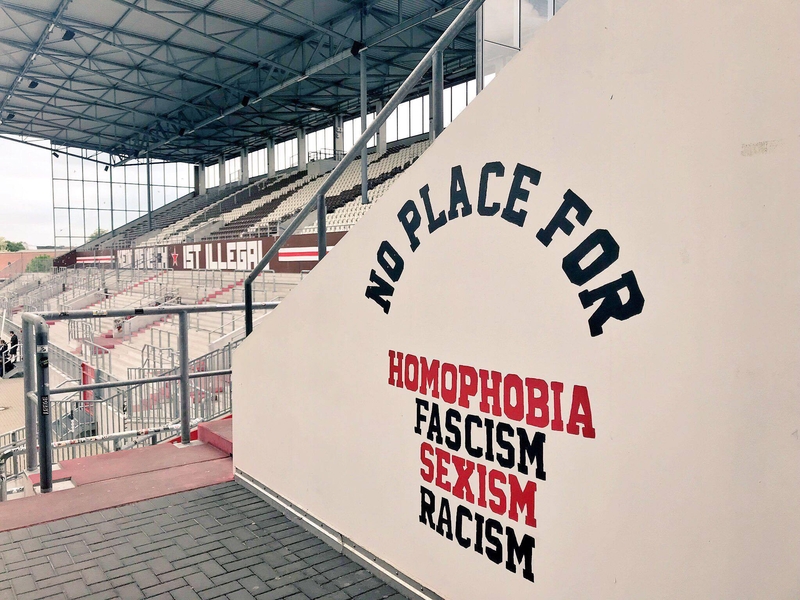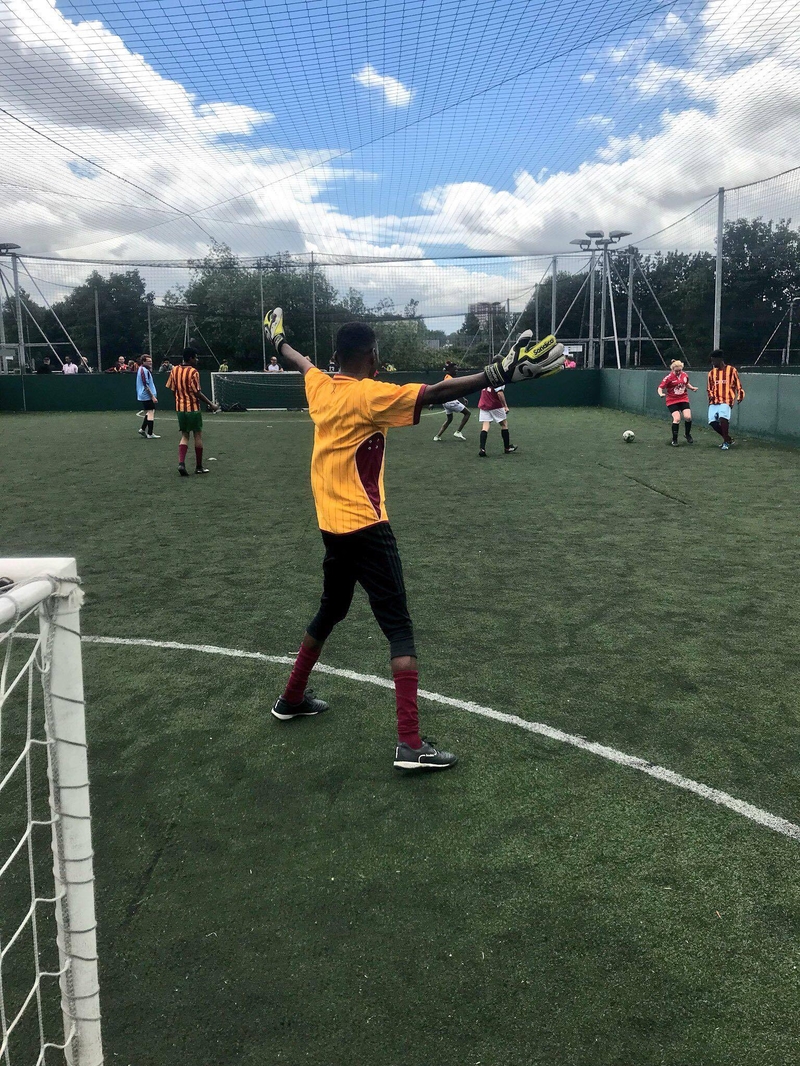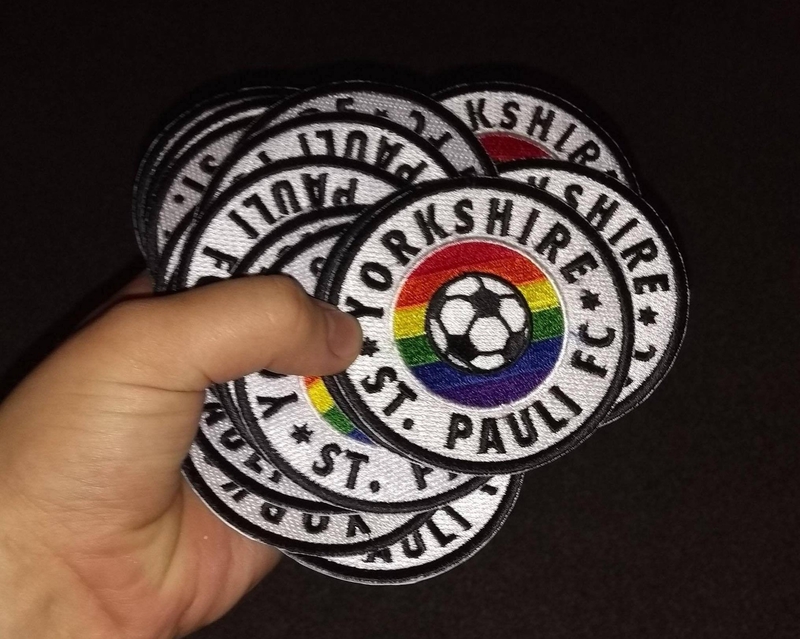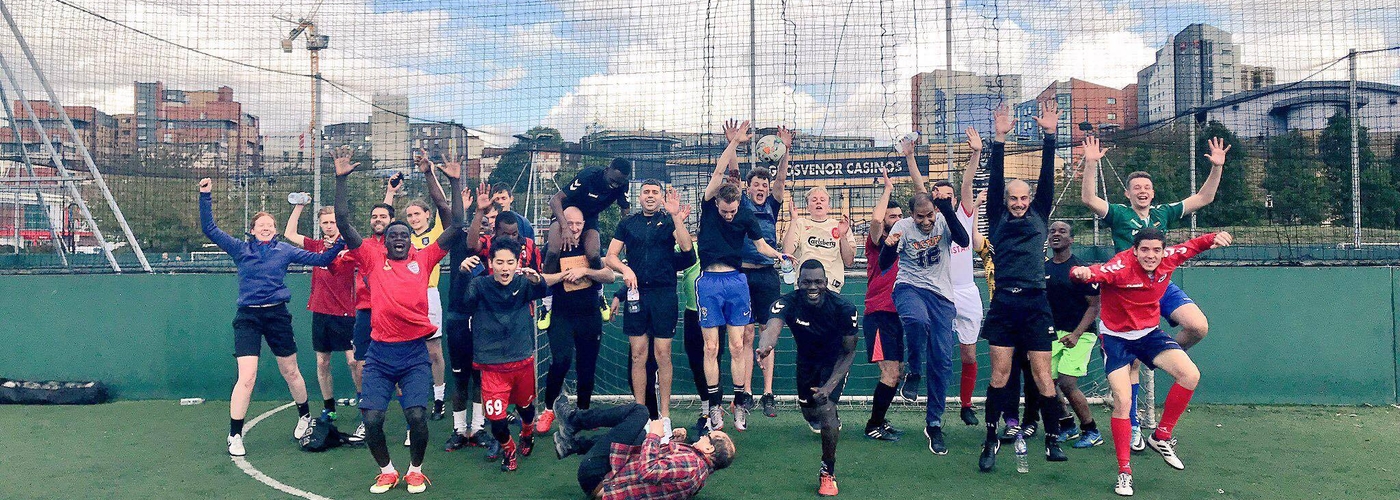The Football for All (FFA) project by Yorkshire St Pauli is putting friendship back on the pitch
Football can be an evocative word. Whether it takes you back to Saturday mornings running across a muddy patch of grass, to the blazing World Cup madness of summer 2018, or to the chesty roar of chanting fans, chances are you’re thinking of something competitive, something skills-based – something intensely ‘sporty’.
But head down to Wellington Street’s Powerleague pitches on a Sunday afternoon, and you’ll discover a very different kind of game. Here, you’ll find cheering and laughter and the occasional chunk of applause, as plastic footballs and New Balance boots skid on AstroTurf. Then, you’ll find Football for All (FFA), the Yorkshire St Pauli project challenging perceptions of football with a simple yet powerful ingredient. Friendship.
Second division German football is a bit of a hard sell. People wanted to actually play...
Roll back five, maybe six years – Chris Webster, one of the project’s main champions and organisers, casts his mind back through half a decade of inclusive football. He remembers the moment a small group of Leeds folk started coming together to watch German anti-fascist, social activist club, FC St Pauli, play.
The group would watch the matches in Wharf Chambers, passing a glass round at the end of the game to raise a few quid for PAFRAS (Positive Action for Refugees and Asylum Seekers, a charity based in Leeds). “It started feeling a bit too easy,” says Chris. “We wanted to do more, so we started inviting service users from PAFRAS down to watch with us.”

The feeling of community and friendship was strong, but after a while, the draw of the screen wasn’t enough to keep everyone transfixed. “Second division German football is a bit of a hard sell,” smiles Chris. “People wanted to actually play, and that’s how FFA started.”
The St Pauli fans joined an existing five-a-side league, but despite the appetite to play, the space wasn’t right for what they wanted to achieve. Chris explains how subtly unwelcoming traits crept in, particularly towards the refugees and asylum seekers on the team. “There was a lot of aggression on the pitch – we wanted to play football for fun, and in that space, it just wasn’t fun, so we decided to do our own thing.”
Driven by the ambition to create their own space – a space based on friendship, powered by connection, and fluent in the language of kicking a ball about in an uncompetitive way, Chris and the team booked a pitch at Powerleague. “We said clearly from the start that we were there to have fun, to play in a chilled-out way and to make friends – and it just exploded from there.”

It’s hard not to feel the impact of Chris’s dedication to reframing football as a purposeful mechanism for change and connection. It’s both infectious and endearingly impressive, especially when you hear the numbers. “We’re getting 30 to 40 people every week now, and about half are refugees or people seeking asylum,” he says. “The most we ever had was about 50 players on the pitch – and that was a struggle! But we managed.”
FFA is mixed-gender, open to all abilities, and fuelled by something more than just the sport. When I ask Chris why he thinks the biweekly sessions manage to leave behind the negative stereotypes of hyper-masculine footie so successfully, he sits back to give it some thought.
“Everyone there is connected by a purpose. It’s doing something with your body, so there’s a sense of mindfulness in that, but it’s about looking out for each other as well,” Chris muses. “Really, it’s just about having a laugh. Nobody’s keeping score, and everyone’s in tune with each other.” He tells me how football’s relatively uncomplex rules and pretty much universal familiarity make it the perfect vehicle for escape – escape from the borders and boundaries that constrain many of the players in other aspects of life.

Right now, FFA happens twice a week at Powerleague. Chris tells me how they organise regular lifts to make sure no one is held back by lack of funds, and – thanks to a miraculous discovery of £10 New Balance football boots and an equally miraculous crowd-funder – they have a decent range of kit for anyone who needs it.
Conversation turns to plans for the future, which, like the entire FFA ethos, are down-to-earth, grounded in reality, and focused on how to help people make friends and have fun. Chris tells me how a two-thousand-euro donation from Leeds band the Kaiser Chiefs (remember them?) has allowed them to expand sessions to a seven-a-side pitch, not to mention top up the supply of shirts and socks.
“It’s just growing organically – that’s what it’s always done, and that’s what we want it to keep doing,” he says. “We’re not a charity, we’re not a big organisation, we don’t have council funding – we don’t even have a bank account,” Chris smiles a smile balanced perfectly between pride and determination, “We’re just a bunch of mates having a kick about, and it should never feel like more or less than that.”
How to get involved:
As the name suggests, everyone is welcome to join FFA. When I headed down for a kick about last weekend (having not gone anywhere near a football for a good ten years), I was knocked for six by the lack of judgement, the camaraderie and the pure joy of the experience. For friendship, for exercise, for getting stuck in, I’d really, really recommend it.
Head over to the Facebook to see what the team is up to, or check out the Yorkshire St Pauli website for more information about the support group and the sessions.
If football’s not your thing, but you’d like to support the work of PAFRAS, you can donate to them here.



